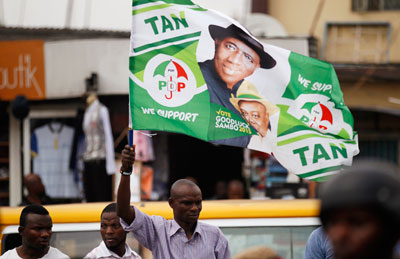Abuja, Nigeria, February 3, 2015–The Committee to Protect Journalists today called on Nigerian authorities to ensure that international journalists are allowed access to cover the country’s elections this month.
Nigeria’s presidential and parliamentary elections are scheduled for February 14, while state elections are set for February 28. President Goodluck Jonathan is seeking re-election amid an insurgency by the radical Islamist group Boko Haram, which has taken over territory in the country’s northeast. International observers have called on Nigeria to ensure a free and fair election, while some analysts have warned of low turnout amid fears of violence, according to news reports.
“The legitimacy of Nigeria’s election depends in no small part on whether the international press is allowed to cover it,” said Peter Nkanga, CPJ’s West Africa representative. “We call on authorities to quickly cut through the red tape and approve visas and accreditation for foreign journalists.”
Kayode Idowu, a spokesman with the Independent National Electoral Commission, told CPJ that for foreign journalists to be allowed to cover the elections they are expected to have arrived in Nigeria, applied to be accredited, and obtained their Elections Press Pass from INEC by February 11.
Geoffrey York, Johannesburg-based correspondent for the Canadian daily newspaper Globe and Mail, wrote on Twitter last week that Nigeria had blocked at least 40 journalists from entering the country to cover the elections. The Foreign Correspondents Association of Southern Africa issued a statement on Friday saying many of its members had been denied visas or accreditation.
Journalists at one international news outlet–who asked that the outlet not be named as it continues to seek access to cover the elections–told CPJ that it had made eight different visa requests from locations including Paris, London, Nairobi, Dakar, and Johannesburg. All of the applications, submitted between December 2014 and January 2015, had been delayed by embassy officials requesting additional paperwork, the outlet said.
However, some international journalists have been granted access. Journalists from The New York Times, BBC, and the Netherlands-based television channel RTL Nieuws told CPJ they had visas approved.
Difficulty in getting visas may be compounded by discrepancies in the application process from embassy to embassy and between embassies and the Nigeria Immigration Service.
According to the guidelines on the Nigeria Immigration Service website, journalists can apply for visas by completing an application form, paying fees, and submitting payment receipts, passport, and other documents to the Nigerian embassy in their country of residence. Chukwuemeka Obua, a spokesman of the Immigration service, told CPJ that there is no special application for journalists.
However, seven other journalists, speaking on condition of anonymity, told CPJ that Nigerian embassy officials were asking international journalists to get approval letters from Nigeria’s Information Ministry in Abuja. The websites of some Nigerian embassies and consulates, including in Paris and in Ottawa, Canada, also state that journalists’ entry requires approval from the Ministry of Information.
Joseph Mutah, a spokesman for the Information Ministry, told CPJ that all visa requests had been sent to the Director General of the National Intelligence Agency (NIA) for security clearance and approval.
The NIA is under the Office of the President. Presidential spokesmen Reuben Abati and Doyin Okupe did not respond to CPJ’s calls and text messages requesting comment.
Separately, thugs attacked at least five local journalists on Monday following a bomb blast in Gombe State, northeastern Nigeria, according to news reports. The blast occurred minutes after President Goodluck Jonathan’s convoy left after an election campaign. The journalists’ bus was also damaged.
